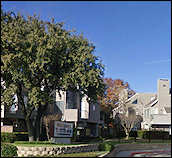 The Office of Foreign Assets Control (“OFAC”) was feeling left out as the one branch of Treasury not tangled up in the foreclosure crisis, so it decided to take a whack at a condominium association that was just trying to get paid past due condo fees on a foreclosed condominium. Under the guise of penalizing Charles Taylor of Liberia and his cronies, OFAC instead penalized a bunch of condo owners in Texas who probably thought that Liberia was a trendy hangout in New York for liberals. According to the latest penalty release issued yesterday, OFAC fined the Richland Trace Homeowner’s Association $9,000 in connection with a court-ordered and OFAC-licensed foreclosure of a blocked condominium which resulted in a payment of $9,500 in past due condominium fees to Richland Trace.
The Office of Foreign Assets Control (“OFAC”) was feeling left out as the one branch of Treasury not tangled up in the foreclosure crisis, so it decided to take a whack at a condominium association that was just trying to get paid past due condo fees on a foreclosed condominium. Under the guise of penalizing Charles Taylor of Liberia and his cronies, OFAC instead penalized a bunch of condo owners in Texas who probably thought that Liberia was a trendy hangout in New York for liberals. According to the latest penalty release issued yesterday, OFAC fined the Richland Trace Homeowner’s Association $9,000 in connection with a court-ordered and OFAC-licensed foreclosure of a blocked condominium which resulted in a payment of $9,500 in past due condominium fees to Richland Trace.
At issue was a condo owned by Richard Chichakli, an alleged associate of Viktor Bout. Chichakli was added to the SDN list by OFAC in 2004. You can read his side of the story here, at least until OFAC goes after the hosting provider for Chichakli’s site. (How many U.S. hosting providers do you think check the SDN list before providing web hosting services to U.S. individuals?)
Once Chichakli became an SDN, it obviously became impossible for him to pay his mortgage or his condo fees, which led to the foreclosure on his condo. Now here is the fishy part. Apparently, the condominium association, and not the bank, filed for and obtained the court order of foreclosure and had received an OFAC license to do so. Even so, OFAC objected to Richland Trace receiving any of the condo fees from the foreclosure relying on a provision of the license stating that it did not cover ““any taxes, costs, or legal, administrative, or other fees incurred or accruing prior to the court authorized foreclosure of the Blocked Premises . . . .â€
Apparently, OFAC gave the condominium association a license to foreclose on the blocked condo, but believed that only authorized the foreclosure payments to go to the bank. Certainly the license wasn’t clear about that or the condo association would never have spent the money on the foreclosure action. And since the association no doubt premised its request to OFAC to foreclose on the basis of the funds owed to the association, it seems reasonable for the condo association to have believed that the license covered those fees and that the language cited above referred to other incidental costs.
That was the association’s first (and last) mistake: believing that OFAC was reasonable.
 Permalink
Permalink
Copyright © 2012 Clif Burns. All Rights Reserved.
(No republication, syndication or use permitted without my consent.)

 Posted by
Posted by  Category:
Category: 

